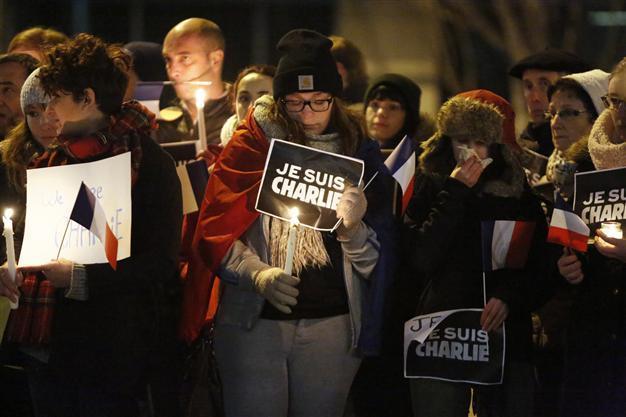Global condemnation, solidarity after 'barbaric' Paris attack
LONDON - Agence France-Presse

People hold a vigil for the victims of the shooting at the Paris offices of the publication Charlie Hebdo outside the French consulate in Seattle, Jan. 7. REUTERS Photo
The U.N. Security Council led global condemnation of the "terrorist" shooting at French magazine Charlie Hebdo on Jan. 8 which left 12 people dead, in a shocking attack on freedom of speech in Europe.
U.S. President Barack Obama and Queen Elizabeth II offered their condolences to those affected after masked men armed with Kalashnikov automatic rifles opened fire at the Paris offices of the satirical weekly.
Pope Francis said there could be no justification for "the horrible attack that plunged the city of Paris into mourning."
The Committee to Protect Journalists said the shooting was a "brazen assault on free expression in the heart of Europe", while Reporters Without Borders called it a "black day."
On social media, people across the world showed their solidarity with the publication by posting the hashtag #JeSuisCharlie - "I am Charlie".
Tens of thousands also rallied in cities across France and Europe in a show of solidarity with the victims.
French President François Hollande condemned as a "terrorist attack" the massacre at the publication, which has been in confrontation for years with Islamists who accused it of attacking their religion through cartoons.
Hollande's characterisation of the incident was echoed by the 15-member U.N. Security Council, which condemned the "barbaric and cowardly terrorist attack".
U.N. Secretary General Ban Ki-moon said the "horrendous, unjustifiable and cold-blooded crime" was "meant to divide. We must not fall into that trap."
Obama said: "Our thoughts and prayers are with the victims of this terrorist attack and the people of France at this difficult time." U.S. Secretary of State John Kerry later addressed the people of France in televised remarks in French, saying: "All Americans stand by your side."
In Rome, Italian Prime Minister Matteo Renzi went to the French embassy to say: "We are all French, because we think freedom is the only 'raison d'etre' of Europe and European citizens."
British Prime Minister David Cameron said the attack was "sickening", while German Chancellor Angela Merkel called it "despicable", sentiments reflected across European capitals.
In a rare statement on international events, Queen Elizabeth offered her "sincere condolences" to those affected by the attack.
There was also condemnation from Russian President Vladimir Putin, Canadian Prime Minister Stephen Harper, Japanese Prime Minister Shinzo Abe, Turkish President Recep Tayyip Erdoğan, Egyptian President Abdel Fattah al-Sisi and the Chinese foreign ministry among others.
Israeli Prime Minister Benjamin Netanyahu for his part called for global unity to fight the "scourge" of radical Islam.
Iran also condemned the massacre but reiterated its criticism of the magazine's 2006 publication of cartoons of the Prophet Mohammed.
"Making use of freedom of expression... to humiliate the monotheistic religions and their values and symbols is unacceptable," foreign ministry spokeswoman Marzieh Afkham told the official IRNA news agency.
The gunmen were heard to shout "we have avenged the prophet" and "Allahu akbar" ("God is greatest"), according to French police.
Egypt's Al-Azhar University, Sunni Islam's most prestigious centre of learning, called the attack "criminal" and said "Islam denounces any violence", while the Arab League also condemned the attack.
The foreign ministry of Qatar, which is accused of backing radical Islamic groups, added: "Such acts that target unarmed civilians contradict all principles and moral and human values."
Turkish Foreign Minister Mevlut Cavusoğlu said his country condemned all forms of "terror", but said terrorism and increasing Islamophobia in Europe were "interconnected".
"We must fight against increasing racism, xenophobia and Islamophobia in Europe which threaten all our values. We must also fight against any form of terrorism," he said.
In Mali, where the French military launched an offensive in 2013 against radical Islamist groups, President Ibrahim Boubacar Keita condemned "the attack against democracy and freedom" and reaffirmed his country's commitment in the fight against terrorism.
Salman Rushdie, the British-Indian writer who was forced into hiding in 1989 after Iran issued a death sentence on him for allegedly insulting Islam, hailed Charlie Hebdo's style.
"I stand with Charlie Hebdo, as we all must, to defend the art of satire, which has always been a force for liberty and against tyranny, dishonesty and stupidity," he said.
He added: "Religions, like all other ideas, deserve criticism, satire, and, yes, our fearless disrespect."
Media rights groups also criticised the attack.
"The scale of the violence is appalling," said Robert Mahoney, deputy director of the New York-based Committee to Protect Journalists.
"Journalists must now stand together to send the message that such murderous attempts to silence us will not stand."
Security was reportedly stepped up Wednesday at the Danish newspaper that provoked angry and sometimes deadly protests worldwide by publishing a series of cartoons of the Prophet Mohammed in 2005, later reprinted by Charlie Hebdo.
"Completely defenceless and innocent people became the victims of what appears to be an attack on free speech," said Denmark's Prime Minister Helle Thorning-Schmidt.
